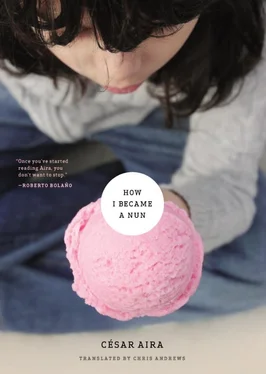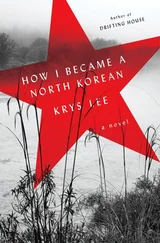I had to fall back on a mnemonic system. My memory was perfect, but it wasn’t enough. I had gotten myself into a situation where I needed something more. I needed a method, and my method made use of an image of the classroom full of children. To compose this image I needed the figures to be still and silent. Now, in that classroom, and I suppose it would be the same with any class of forty-two six-year-olds (not counting me), it was rare for all the children to be sitting quietly in their places. The only time it happened, in fact, was when the teacher read out the roll. It was like a litany, first the surname, then the first name (mine, which should have come second, between Abate and Artola, was missing). By dint of repetition, I had learned the roll by heart. And in my mind it was like the soundtrack for the mental image of the classroom, each child in his place like a memory peg … Unfortunately the combination meant I couldn’t use the image in a straightforward way, because the alphabetical order of the children’s names on the soundtrack didn’t coincide with the order of their places in the room. So I was forced to zigzag laboriously; one order was superimposed on the other …
I found this pastime absorbing. So absorbing that it began to give me pleasure, the first lasting and governable pleasure of my life. It was an aching, almost overwhelming pleasure — that’s just the way I was. And soon it underwent a sublimation, transcending itself … Almost independently of my will, it created a supplement, which my imagination seized upon with a mad voracity. I transcended school. I began to give instructions. Instructions for everything, for life. I gave them to no one, to impalpable beings within my personality, who didn’t even take imaginary forms. They were no one and they were everyone.
The instructions I gave could refer to anything at all. In principle, they were instructions for something I was doing, but they could also be for an activity in which I was not and would never be engaged (such as scaling a mountain peak), which didn’t stop me prescribing a method for it in the minutest detail. But mainly my instructions referred to what I happened to be doing; that was the default case, the model. It got to the point where everything I did was doubled by instructions for doing it. Activities and instructions were indistinguishable. If I was walking I would also be instructing a ghostly disciple in how to walk, the best method for walking … It wasn’t as simple as it looked, nothing was … Because true efficiency was a kind of elegance, and elegance required minutely detailed knowledge, so detailed it was peculiar to me, an esoteric idiosyncrasy that only I could pass on … though to whom, I didn’t know, maybe no one, but then again … The game took over my life. How to hold a fork, how to raise it to one’s mouth, how to take a sip of water, how to look out the window, how to open a door, how to shut it, how to switch on the light, how to tie one’s shoelaces … Everything accompanied by an unbroken flow of words: “Do it like this … never do it like that … once I did it like this … be careful to … some people prefer to … this way the results are not so …” It was a rapid flow, very rapid, with never a pause for me to catch my breath, because keeping up the pace was essential to getting it right, and I was setting an example. There were so many activities for which I had to issue instructions … no end to them … and some were simultaneous: glancing slightly to the right at a point just above the horizon, controlling the movement of the eyes and the head (and this glance had to be accompanied by some elegant and appropriate thought, or it would be worthless!), at the same time as picking up a little stone with a precise movement of the fingers … How to manipulate cutlery, how to put on one’s trousers, how to swallow saliva. How to keep still, how to sit on a chair, how to breathe! I was doing yoga without knowing it, hyper-yoga … But it wasn’t an exercise for me: it was a class. I took it for granted that I already knew everything, I had mastered it all … that’s why it was my duty to teach … And I really did know it all, naturally I did, since the knowledge was life itself unfolding spontaneously. Although the main thing was not knowing, or even doing, but explaining, opening out the folds of knowledge … And so curious are the mechanisms of the mind and language, that sometimes I surprised myself in the role of pupil, receiving my own instructions.
MOM WAS MY BEST friend. It wasn’t one of those choices that defines a personality, or any other sort of choice, but a necessity. We were alone, isolated. What did we have left to cling to but each other? In such cases we make a virtue of necessity, which doesn’t mean it’s any less virtuous. Or any less necessary. Our necessity wasn’t deep, it didn’t have roots or ramifications. It was a casual, provisional necessity. It would be hard to find two beings with fewer affinities than Mom and I. We weren’t even complementary opposites, because we were alike. She was a dreamer too. She would have preferred to hide it from me, but some tiny sign gave her away. Our secret personalities are revealed by furtive actions, but they were what I noticed first of all, so poor Mom had no hope of pretending with me. My monstrous, piercing eyes prevented any living being from merging into the background of my life.
Nevertheless, I made a friend that year: a boy, a neighbor, we played together, a friend in the normal sense of the word … I was becoming almost a normal little girl, in the normal sense of the word (the word “normal” that is). But no, that’s going too far. The story of my friendship with Arturo Carrera is peculiar in the extreme.
We lived, as I think I’ve already said, in a run-down tenement in a poor neighborhood of Rosario, near the river. We occupied a single room, one of the better ones, as it happened, on the top floor. Places like that are normally swarming with children, but the owners of the building didn’t allow them. They had made an exception for me because I was an only child, because Mom was desperate and, above all, because she told them I was mentally retarded, which was believable given my appearance. There must have been some more complicated reason why they made an exception for Arturo Carrera, but I’ve never tried to get to the bottom of it. (Although it’s the key to everything.)
He had lost his father and his mother; his only living relative was his grandma, and she in turn had no one else but him. The same situation as Mom and me, but much more so: we were temporarily alone in Rosario; they were definitively alone in the world. Also their relationship was not at all like ours, since they were so different from us. The grandmother was very old, as small as a child, with white hair and a black dress. She spoke a Sicilian dialect and no one except her grandson could understand her. Nevertheless, she went out and did the shopping on her own, and talked with all the neighbors. I don’t know how she managed.
As for Arturito, he was very small for his age. He was seven, a year older than me, but his head didn’t even come up to my shoulder, and I wasn’t tall. He had a very pale, waxy complexion and blond hair, which he slicked back with oil. But what really made it obvious that he didn’t have a mother or a father or aunts or anything were his clothes. Any reasonable adult would have made him dress in a manner more suited to his age. As it was, he could indulge his whims. He wore suits, with starched white shirts, cufflinks and ties; sometimes they were three-piece suits with a waistcoat, or a checked sports jacket with grey flannel trousers, and claret-colored moccasins buffed to a high polish. He looked like a dwarf. His taste in fabrics and cuts was appalling, but that was nothing compared to the fabulous incongruity of wearing that kind of attire. And yet, it has to be said that he didn’t attract too much attention. Perhaps the people in the tenement and the neighborhood had gotten used to him. Perhaps those ridiculous outfits suited the kind of kid he was. He had a strong personality, you had to give him that. And perhaps the price he had to pay for it was the incongruity of his clothes. By contrast I had no personality. I was prepared to pay the price, but I couldn’t imagine what it might be. As well as being impossible for financial reasons, imitating Arturito wouldn’t have done me any good, although there was no one else I could have taken as a model. So I gave up the idea of imitating him and having a personality, dimly intuiting that my only hope of being someone lay in this renunciation. I became anxious. I looked at myself in the mirror and couldn’t find a single distinctive feature. I was invisible. I was the girl in the crowd. Without a moment’s hesitation, I would have exchanged my regular, pretty features for Arturito’s nose …
Читать дальше












